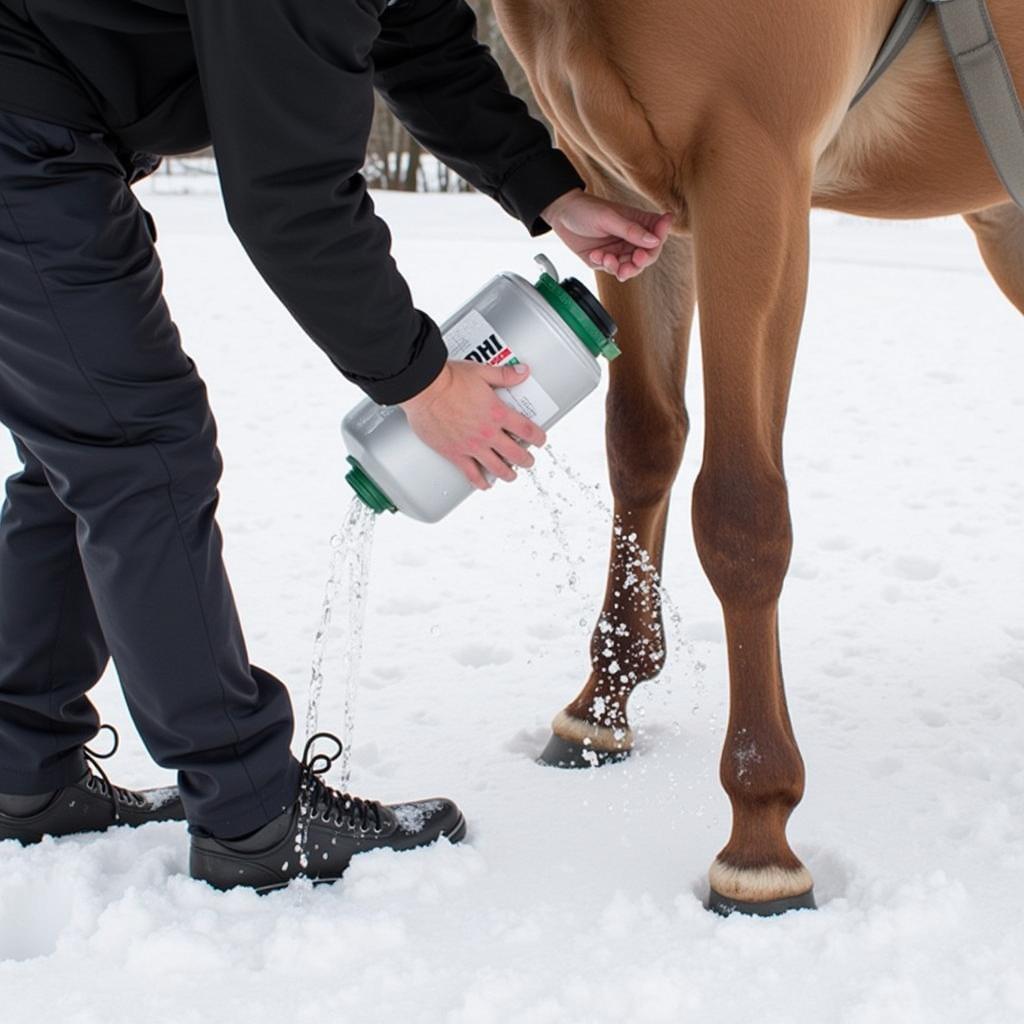Yes, horses can absolutely get frostbite. Just like us, their extremities are most vulnerable to the damaging effects of extreme cold. Understanding how frostbite affects horses and knowing how to prevent it is crucial for responsible horse ownership. After reading this, you’ll be better equipped to protect your equine companions during winter’s harshest months.
Understanding Frostbite in Horses
Frostbite occurs when body tissue freezes due to prolonged exposure to freezing temperatures. In horses, the areas most susceptible are the ears, the lower legs, and the tail. Early signs can be subtle, including skin that appears pale, grey, or bluish. As the condition worsens, the affected area may become hard and cold to the touch. Eventually, the skin may turn black as the tissue dies.
You should check your horse’s water supply regularly during cold weather. A horse water tank heater can be invaluable in preventing the water from freezing.
Identifying the Signs of Frostbite
Recognizing the symptoms of frostbite early is essential for effective treatment. Initially, the affected area might feel cold and numb. As the condition progresses, your horse may show signs of pain or discomfort when the area is touched. Blisters may form, and the skin can become hard and leathery. In severe cases, the tissue may die and turn black.
What to Do if You Suspect Frostbite
If you suspect your horse has frostbite, contact your veterinarian immediately. While waiting for the vet, you can gently warm the affected area with lukewarm water – never use hot water or direct heat, as this can cause further damage. Do not rub the area, as this can also worsen the injury. Once the area is warmed, keep it dry and bandaged.
 Applying Lukewarm Water to a Frostbitten Horse Leg
Applying Lukewarm Water to a Frostbitten Horse Leg
Preventing Frostbite in Horses
Prevention is always better than cure when it comes to frostbite. Providing adequate shelter is crucial. A well-insulated barn can protect horses from the worst of the winter weather. For horses living outdoors, ensure they have access to a windbreak or a thick-bedded, dry area where they can seek refuge from the elements.
When it comes to protecting your horse’s legs, especially draft breeds, draft horse boots can provide an extra layer of warmth and protection.
The Importance of Blankets and Rugs
Blanketing your horse is a vital part of winter care. Choose a blanket appropriate for the temperature and your horse’s individual needs. Make sure the blanket fits well and is dry and clean. A wet blanket can actually exacerbate the effects of cold.
“A good quality, well-fitted blanket can make all the difference in preventing frostbite,” says Dr. Emily Carter, DVM, an equine veterinarian specializing in cold weather care. “Remember to check your horse regularly to ensure the blanket isn’t damp or causing any rubs.”
Maintaining Proper Hydration
Just because it’s cold doesn’t mean your horse needs less water. In fact, dehydration can make them more susceptible to cold-related injuries. Ensure your horse has access to unfrozen water at all times.
Using cooling boots for horses might seem counterintuitive in winter, but they can be helpful after exercise to prevent chills.
Conclusion
Frostbite is a serious condition that can have lasting consequences for your horse’s health and well-being. By understanding the risks, recognizing the signs, and taking preventative measures, you can help keep your equine companions safe and warm throughout the winter months. Remember, proactive care is the best defense against frostbite.
FAQ
- What are the first signs of frostbite in horses? Pale, grey, or bluish skin on the ears, lower legs, and tail.
- What should I do if my horse has frostbite? Contact your veterinarian immediately.
- How can I prevent frostbite in my horse? Provide adequate shelter, blankets, and unfrozen water.
- Can I use hot water to warm a frostbitten area? No, use lukewarm water only.
- Are certain breeds more susceptible to frostbite? Yes, horses with thinner coats and less body fat.
- How important is blanketing in preventing frostbite? Very important, choose a dry, well-fitted blanket.
- What should I do if I see blisters on my horse’s skin in winter? Contact your vet, it could be frostbite.
Need help? Contact us! Phone: 0772127271, Email: [email protected]. Our address is QGM2+WX2, Vị Trung, Vị Thuỷ, Hậu Giang, Việt Nam. We have a 24/7 customer service team ready to assist you.